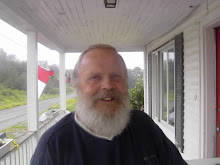The two people from my past that died were a former teacher and a neighbour chum who I knew before I went to school and have not seen since I left to go to University. We each lived our adult lives without knowing anything of each other. Sad in a way, althought we were not that friendly by the time we went to Junior and Senior High School.
My former teacher was Arnold (Arne) Eurgene Forde. He was a much admired and eventually beloved teacher who spend his whole teaching career in my home town's school system. He came to teach in our small town rural high school, right out of University, I figure. He was only a 7 to 10 years older than the student he taught. He came from the Maritmes as a graduate from Acadia University. He was an African Canadian from that region where there was a historic presence of African Canadians who orginally fled the United States. For those of us in our small school, he was the first African Canadian we had even seen let alone met. I have often wondered why he came to our small white ghetto of a community outside Toronto. He was in fact the first African Canadian ever hired by our school board. I believe shortly after he became one of our teachers we got our first student who was an African Canadian in our school. In those days, the largest ethnic group we were aware of were Italian. I would have loved to have asked Arne why he came to our community, I never did. He ended up making a remarkable contribution to generations of students lives.
To our community's credit and as a tribute to him as a person who carried himself with authority and yet was open and generous with the students, there was little negative comments about him at a time when racial struggles south of the border filled the news headlines. He quickly was accepted and soon became a favourite teacher of many of us. He coached a lot of the sports team although I remember clearly that he always said he was a classroom teacher , first, (physics, I think) and a volunteer to help out with the sports.
Years later, when I returned to Canada from my years in the United States I met him at the hockey arena. He had three boys playing hockey around the age of my son. It was then that I was aware of what few years there were between us. His career saw him teach and become the principal of two other high schools in our growing town, now a city. No longer is it the white community of my youth. It is a very diverse multicultural city with the largest visible minority being South Asian althought I suspect almost every ethnic group is represented. This transformation is representative of the changes in Canada over these years such that now urban Canada is the most ethnically diverse country in the World. Our government policy of bilingualism and multiculturalism built upon aboriginal values ( read A Fair Country by John Ralston Saul to understand these enduring values) has brought about this change in our country. For me, awareness of visible minorities began with Arne Forde. It was an easy transition for me for I was raised by a mother who taught us that all people were equal and that all people are interesting and not to be feared. In some ways, our family views were a little ahead of our neighbours. I remember the Forde's considering purchasing our house the first time my father tried to sell it. No sooner had they viewed it with the agent that our neigbours were calling wanting to know all about it. They were anxious and I suspect had visions of their properties being devalued if a "coloured " family moved it. As it turned out the Fordes could afford a better house than ours about a mile away , where they continue to live.
Arne Forde might very well have been the most effective and loved teacher in the city over all the years. Many of his former students kept contact with him. He also contributed to the community thoughout his life coaching many community teams. I shall remember him always with great respect and fondness.
The other person who died was Richard Dinning. He lived down the street from me from the time we moved in when I was about four. We were the same age. His mother and mine became fast friends for the rest of their lives. They were the only Catholic family we knew and it was not until I was an adult that I learned that Mrs. Dinning was a French Canadian. Such was the white protestant ghetto we lived in.
The death of these two people from my past made we aware that I am entering the years when I will see many friends and acquaintances die, causing me to recall the times and lessons from years past. The last time I had death teach me lessons was when I was a late teenager and had about 6 close friends die. Those being the years when I spent a lot of time trying to sort of the meaning of life, these events may have contributed to my eventual decision to study philosophy and become a minister. It certainly added food for thought. Once again, deaths may find me revisiting and reevaluating my religious notions, may it be an enriching experience.













![[thinkingblogger.jpg]](https://blogger.googleusercontent.com/img/b/R29vZ2xl/AVvXsEhd9OJMeQzSRU2nO1UwIYEiYq7Fy8kqyJou32tkxFyT5DF7GZKLPBVzTtUsTFfGkc6_eQomd-V7nrSg-JEGTRZS378_-eJNQsvb0GIC23MStmn9e0sFTlq_xZ4ZID58dzqFKGXb/s1600/thinkingblogger.jpg)










 Add The Indicator To Your Site
Add The Indicator To Your Site

 Free Typing Tutor
Free Typing Tutor